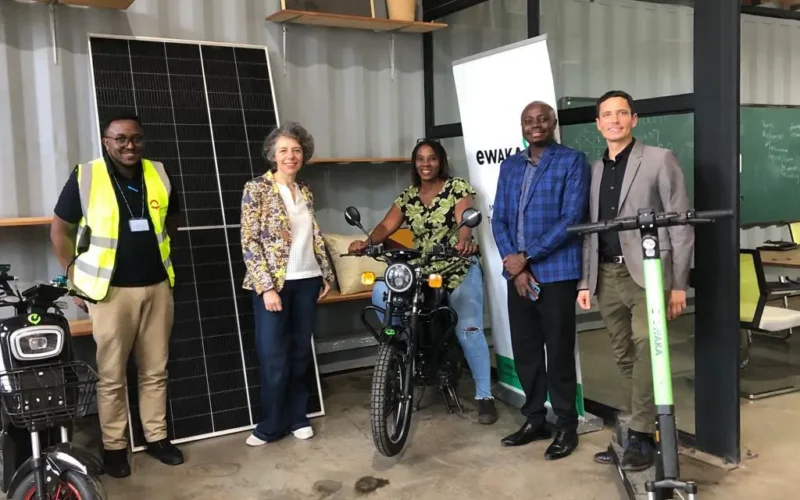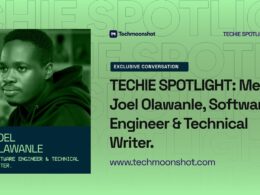Like many Nigerian children, Elijah Asaolu grew up with parents who hoped he’d follow a traditional career path—becoming a doctor, accountant, or pilot. At the time, Elijah didn’t have a clear direction—until his older brother, fondly known as GreatK (and truly great), introduced him to Computer Science just before he registered for JAMB.
Looking back, every step—from that conversation with GreatK to the countless hours of learning and building at OAUSTECH—became a defining part of Elijah’s journey.
In this exclusive conversation, Elijah shares more about the power of community, the courage to pivot, and how moments of clarity can shape the future of a young African technologist.
Elijah, let’s start with your tech journey—how did you get into software engineering?
I always like to tell this story.
Like every other Nigerian parent, my parents wanted me to either become a doctor, an accountant, a pilot, or one of those fancy career paths of their time. I didn’t know what I wanted for myself. However, that changed when my older brother (we call him GreatK, and boy is he great) introduced me to Computer Science, right when I was about to register for my JAMB.
Before that time, I didn’t know what coding was. My thought was that Computer Science graduates were only those people who repaired computers, operated cyber cafés/printing shops, and all that. But GreatK made things clearer. He said I’d be able to build my own games!!! Build robots!!! He’d inspire me by mentioning how people like Mark Zuckerberg and Bill Gates built their own companies as teenagers and became billionaires, and how studying Computer Science can set me on a similar path.
All those talks ignited the fire in me, but the actual learning didn’t start until I joined the Inventors Community at the prestigious Olusegun Agagu University of Science and Technology. Inventors is a major highlight of my career. I met and learned a lot from wonderful leaders like Aderibole Juwon, Anthony Adedayo, Asefon Pelumi, and many others. That community pushed me out of my comfort zone and made me believe I could actually build a career in tech.
You’ve worn many hats—engineer, writer, leader. Which came first, and how did one role influence the others?
Engineering came first and still does. During my humble learning years, I figured I like to write and tell other people about what I’m learning or what I’ve built. This unofficially birthed my technical writing career path. I started by writing on platforms like Dev.to, and I saw that people greatly appreciated what I wrote. Companies would reach out to me to write for them… long story short, engineering influenced my technical writing journey.
Engineering also influenced almost all the leadership roles I’ve had, as those roles required not just decision-making and coordination but also the ability to understand, review, and sometimes contribute to technical work.
You’ve written for LogRocket, Twilio, and Hackmamba—how do you choose what topics to write about?
Most of the articles I’ve written were inspired by technical challenges that I personally experienced. If I find it difficult to solve a technical problem and there’s no existing solid technical article that explains how to solve it, I like to fill in that gap and write about it.
I also get a lot of inspiration from GitHub topics and social platforms like Twitter and Hacker News. I follow specific topics on Twitter, and that has shaped my algorithm to bring me fresh/trending tech topics. So, if I come across something new or interesting, I write about it.
How has writing helped you grow as a developer?
Writing has helped me slow down and truly understand what I’m working on. When you try to explain something to others, especially in a way that makes sense to beginners, you’re forced to break it down properly. That process helps me understand things better too. It’s also helped me spot gaps in my knowledge, improve my communication skills, and become more detail-oriented when coding.
You’re an open-source contributor—what projects have you enjoyed contributing to the most?
I’ve built and contributed to a couple of open-source projects. One not-so-current project I really enjoyed building is URL-images, a tool that lets you generate customized images by simply passing URL parameters. I also created a Next.js DApp boilerplate for developers looking to build Web3 applications using Next.js.
Aside from my own projects, I’ve enjoyed contributing to documentation for popular frameworks like Vue.js, Nuxt.js, and ConsenSys, mostly fixing typos and improving clarity. It ain’t much, but it’s honest work, and it feels good to give back to the tools and communities I’ve learned from.
For someone new to open source, where do you recommend they begin?
I’d say start from the basics. Get yourself familiar with Git and GitHub. Participate in events like Hacktoberfest and join communities like OSCA. Also, you don’t have to be a 10x engineer to start contributing. You can begin by fixing grammatical errors in README files. That’s where a lot of my homeboys and I started.
You led the Google Developer Student Club and the Inventors Community at your university—what impact did that have on your career?
I learned and gained a lot. For one, these roles taught me the true spirit of community. Being a leader, especially in these kinds of communities, doesn’t mean you have to have everything figured out by yourself. I learned how important it is to bring other people in early, delegate, and create space for others to grow while I was growing too. That mindset has helped me even in my professional work. I’ve learned when to lead when to listen, and when to step back and let others shine.
I also had a couple of recruiters reach out to me, specifically highlighting how my leadership roles caught their attention.
If you could go back to your university days, what would you do differently (or double down on)?
I’d double down on building in public. Back then, I was doing cool stuff, learning, experimenting, and building, but I kept most of it to myself. If I had shared more of that journey early on, I probably would have connected with more people, gotten feedback faster, and opened up more opportunities.
How did you and your co-founders come up with the concept for Spidra?
My co-founders and I have done a lot of web scraping ourselves over the years, and it was always painful. Most scraping tools are either too technical or break easily when sites change. Plus, web scraping as a whole is this weird mix of engineering and trial and error. That’s where the idea came from.
We asked, “What if we could build a tool that makes web scraping simple for developers and non-developers?” Something flexible enough for complex workflows but easy enough that anyone can get started with just a URL and a goal. That became the foundation for Spidra.
What’s been the hardest part of building Spidra so far, and how are you handling it?
We’ve had to learn a lot of new skills actively. Spidra is not a pet-side project. We had to get serious about building user-friendly software that scales. We had to think beyond just code. How do you design for people who aren’t technical? How do you make something flexible but simple? These are not questions you deal with in personal projects, but they matter when you’re building something people actually rely on.
All that learning really reshaped our mindset. There were technical concepts we used to think were super complex, but once we figured them out, they became normal. Personally, that shift made me realize there’s nothing we can’t learn or build.
What’s your vision for Spidra in the next year?
My vision is for Spidra to become the go-to platform for web automation and data extraction. I want to see it in the hands of developers, researchers, marketers, and even everyday users who just want to automate boring tasks online.
Imagine being able to extract data from hundreds of pages with a few clicks, monitor changes on websites automatically, or autofill forms at scale without writing custom scripts every time. These are just a few of the use cases we want to make more accessible.
Within the next year, we want to launch publicly, focus on stability, improve our scraping engine to handle edge cases better and expand integrations so users can plug Spidra into the tools they already use.
What do you think engineers today need to focus more on, beyond just writing code?
Learn to adapt. The world is changing now more than ever, and tech moves fast. You need to be able to filter out the noise and recognize which trends actually matter. Not everything shiny is worth chasing, but you also can’t afford to ignore real shifts in the industry.
How do you keep up with new tools, frameworks, and ideas in such a fast-moving space?
I’ve built my Twitter algorithm brick by brick. Carefully. Relentlessly. Over time.
From curating who I follow to what I engage with, what I block, and what I ignore — every part of it has been intentional. Nothing really gets past me at this point.
What’s a piece of advice you got early in your career that still guides you?
When I was younger, GreatK would always tell me that preparation plus opportunity equals luck. That one stuck. I also remember Rancho in 3 Idiots saying, “Follow excellence, and success will chase you, pants down.” That line was funny, but the message hit hard. I also got a lot of advice from my community leaders. One thing they always emphasized was to be really good at what you do. Those lessons still guide me today.
What’s your current favorite tech gadget or tool and why?
The one I own is my 13-inch M1 MacBook Pro. I like the Touch Bar design so much that I still wouldn’t want to let it go after all these years.
The one I’d fancy and would love to get is the Ray-Ban Meta glasses or any AR glasses once they get smarter and more useful.
How do you unwind after a long week of coding and writing?
In the past, I’d play CODM Alcatraz with my homeboys on the weekend. I also watch a lot of movies. I’ve seen all the classics. I’ve probably watched 80% of IMDb’s top 50 movies and a whole lot more. But recently, it’s been a lot of grinding. There’s barely any day off these days.
If you could have dinner with any engineer or tech leader (dead or alive), who would it be?
Steve Jobs. Why? I like that he had a strong sense of “taste” when it came to design.
In the hood where I grew up, we’d randomly get into those iPhone vs Android arguments. Back then, I had never even touched an iPhone, but I’d still argue that it was overpriced, had too many restrictions, and just wasn’t worth it.
That mindset stayed with me until 2018 when I finally interacted with an iPhone 5 (shoutout to Ekunlezky!) A five-minute interaction literally changed years of opinions I had about the iPhone. Everything just made more sense than the average Android phone I’d used. The user experience, the typeface, the subtle interaction sounds, the haptic feedback. It was perfect.
It wasn’t until years later that I watched Steve Jobs videos where he talked about how they built a device that anybody who sees it would fall in love with. This is a big philosophy we have for Spidra too.
Any final words for young engineers trying to build their voice in tech?
Don’t wait till you feel ready. Start showing your work early, no matter how small. Write that blog post, share that side project, and ask that question in public. You don’t need to be an expert to have something valuable to say.
The more you share, the more you learn, and the more visible you become. Stay hungry. Stay foolish.
Thank you for your time, and it’s a pleasure talking with you
Thank you for having me, and it’s a pleasure sharing my experience with you












